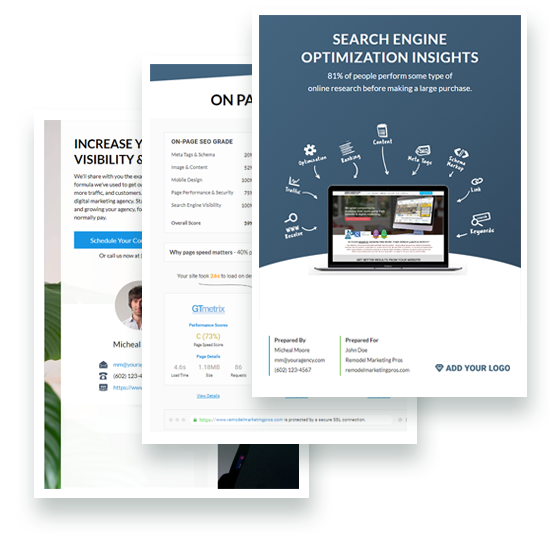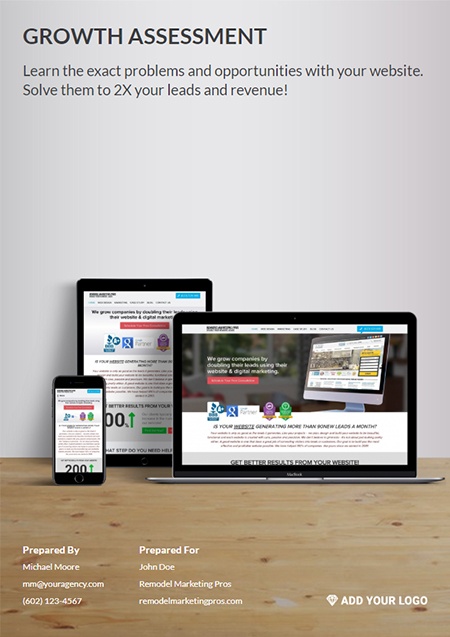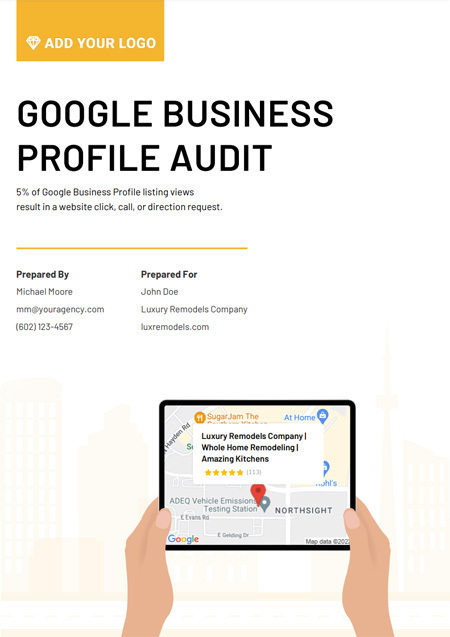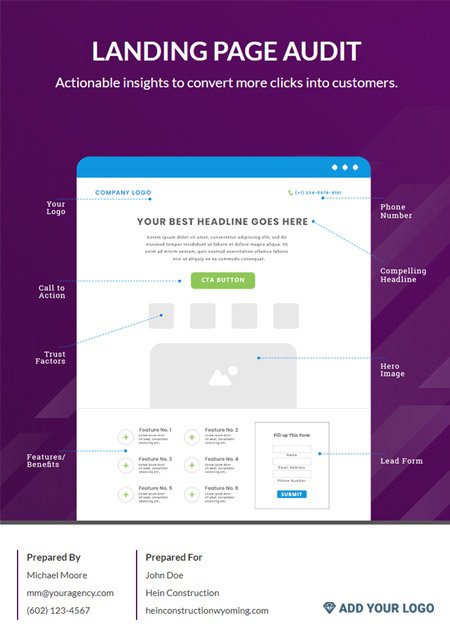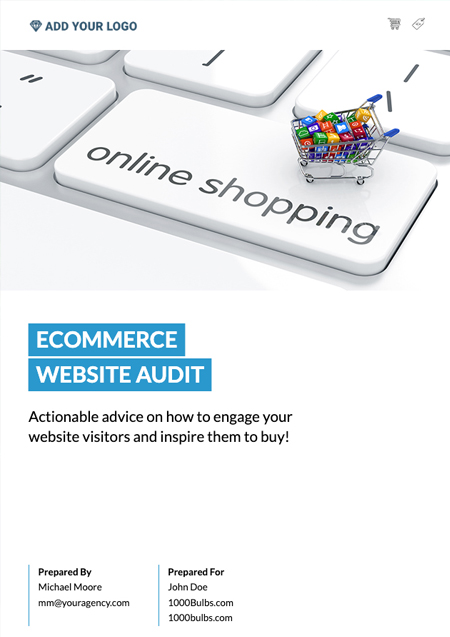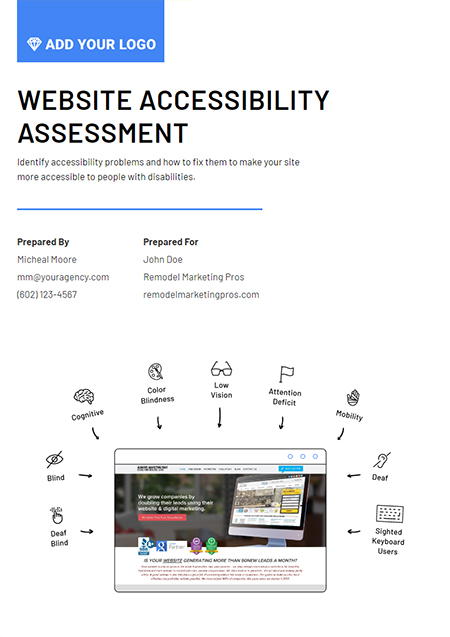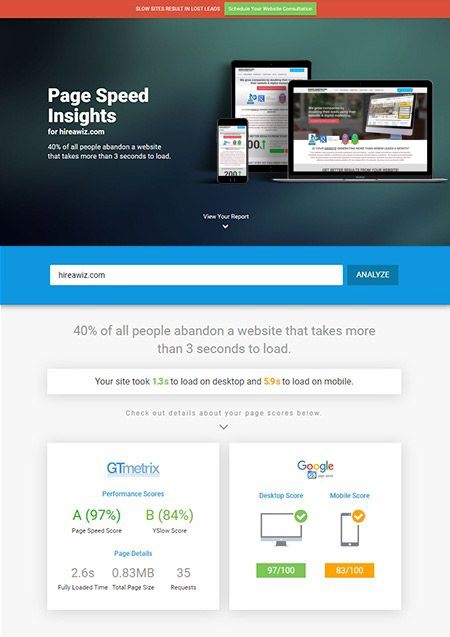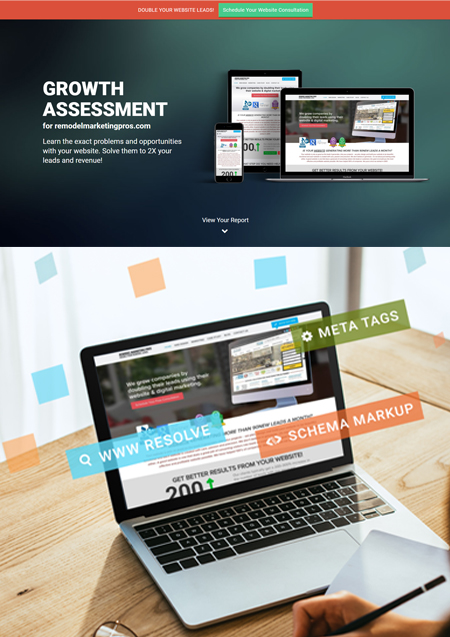
Run a comprehensive SEO audit to uncover your client's growth opportunities
- Analyze and identify SEO opportunities in minutes to enhance your prospect or client's visibility and outrank competitors in search results.
- Eliminate uncertainty by following our proven, step-by-step, actionable SEO audit checklist with detailed implementation guidelines.
- Prioritize high-impact tasks to deliver quick wins and demonstrate immediate value!
Data-driven SEO insights to turn challenges into client wins
- Identify challenges and present them to your prospects or clients as opportunities to rank on page #1 of search engines.
- Make data-driven decisions based on industry best practices to deliver outstanding results consistently.
- Use these insights in your sales process to build credibility, showcase your expertise, and deliver value to close more deals.
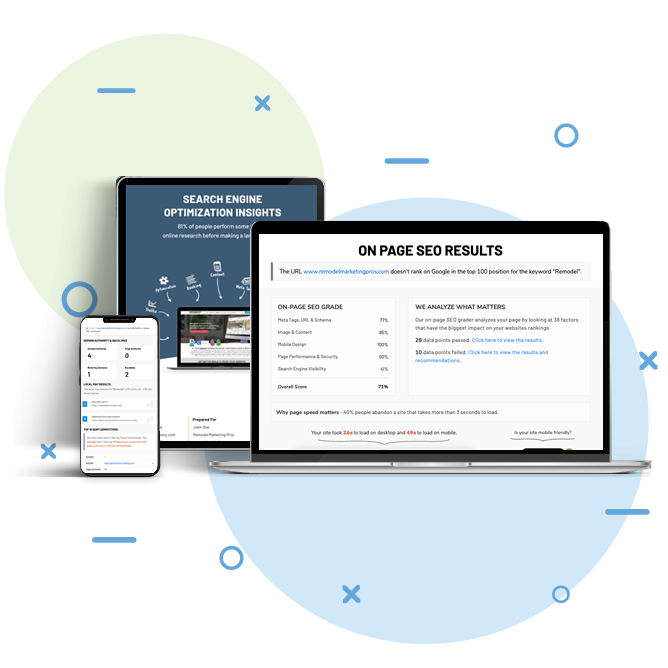
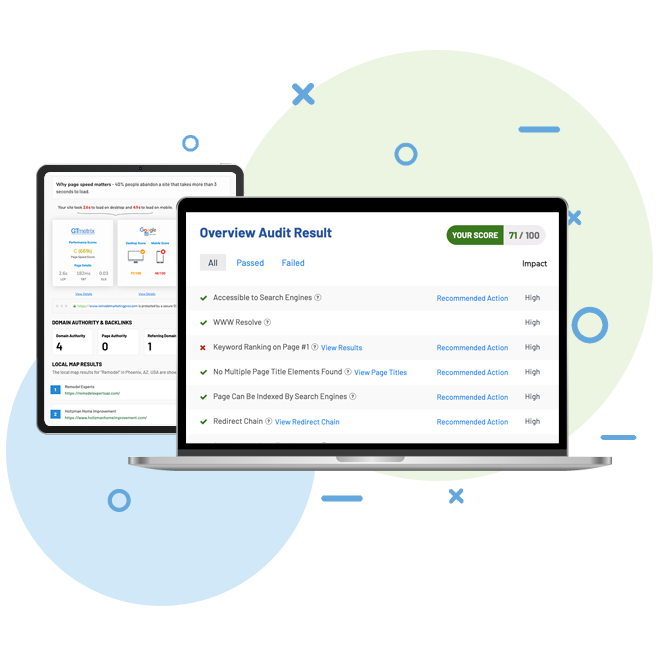
Best SEO audit and reporting tool for agencies
- With our automated SEO audit and AI analysis, you can save hours on every audit, allowing you to focus on strategy and implementation rather than getting bogged down in data analysis and research.
- Impress clients with professional reports that communicate actionable SEO insights to drive measurable results.
- Gain a competitive edge by comparing your prospect or client's SEO performance against industry rivals and identifying key growth opportunities.
SEO Audits For Agencies Workshop Videos
SEO Audits: Sell More SEO Audits & Services In Your Agency
Running & Analyzing SEO Audit For Agency Leads and Clients
Presenting Local SEO Audits & Closing The Sale
Local SEO Audits For Agencies Q&A Session
Case Studies
Discover how we've empowered web and digital agencies to elevate their services with our expert solutions in web design, development, and SEO, leading to enhanced online presence, increased traffic, and higher conversion rates. Our case studies showcase real-world examples of successful partnerships with agencies, delivering outstanding results.
-
![Paul Stoute Paul Stoute]()
$100K
Worth of revenue
Paul Stoute
Stoute Web Solutions -
![John Falke John Falke]()
$200K
Worth of revenue
John Falke
Johnny Flash -
![Rob Riggs Rob Riggs]()
$100,000+ LTV
Using audits with leads
Rob Riggs
Code Conspirators -
![Carol Stambaugh Carol Stambaugh]()
5-Figure Projects
From presenting audit insights
Carol Stambaugh
RadiateWP -
![Barry B Barry B]()
80% Close Rate
For recurring revenue clients
Barry B
BM Group
Search Engine Optimization (SEO) Audit FAQ's
An SEO audit comprehensively analyzes a website's search engine optimization health. It evaluates various on-page and off-page factors that affect search engine rankings and provides insights on how to fix them.
An effective SEO audit can identify on-page SEO errors that are affecting search engine rankings and find opportunities to improve visibility.
SEO audits are crucial for businesses with websites as they identify areas for improvement in their online presence, help increase visibility in search results, and ultimately drive more organic traffic to their website.
SEO audits can be tedious and time-consuming. The best approach is to use a comprehensive SEO audit tool like ours, which automates the process, saves time, and provides actionable insights. Complement this with manual checks for a thorough analysis. We usually recommend auditing and focusing on the most important pages on the site first to get quick wins.
An SEO audit tool automatically scans websites to assess various SEO factors, including site structure, content quality, backlinks, and technical issues. It generates reports with actionable insights for optimization.
Popular tools include My Web Audit (our software), Screaming Frog, SEMrush, Ahrefs, and Moz. To perform a comprehensive SEO audit, you'll need tools such as:
- SEO auditing tools, such as MyWebAudit.com, AHREFS, and Semrush.
- Page speed tools, such as GTMetrix and Google's PageSpeed Insights tool.
- Google Search Console so you can resubmit webpages after optimizing them.
- Google Analytics so that you can focus your audit on the most important and highly trafficked pages.
The good news is that My Web Audit SEO audit tool pulls data from Google, GTMetix, and Semrush, so you don't have to learn how to use multiple tools and subscriptions.
We recommend conducting a full SEO audit every 6-12 months, with more frequent mini-audits (quarterly or monthly) to monitor the ongoing progress of a site's most important pages and proactively address emerging issues.
Regular SEO audits help you stay current with the latest SEO best practices, identify new issues and opportunities for optimization, and address any issues that may arise due to website or algorithm changes.
Offering SEO audits demonstrates your expertise, provides value to clients, helps identify opportunities for improvement, and can lead to additional service offerings and increased client retention.
SEO audits are a powerful tool for web agencies looking to expand their services and increase client value. Here's how they can help grow your agency:
- Client acquisition: SEO audits serve as an excellent "foot in the door" strategy, offering potential clients immediate value and showcasing your expertise.
- Upselling opportunities: Audits often reveal areas for improvement, creating natural opportunities to offer additional services.
- Retainer contracts: Audits can help transition clients into monthly retainer agreements by demonstrating the ongoing need for SEO maintenance.
- Diversifying services: Offering SEO audits allows you to expand your service portfolio beyond website management.
- Competitive edge: Providing comprehensive SEO audits sets you apart from agencies offering only basic website services.
- Quick wins: Audits often reveal easy-to-fix issues, allowing you to demonstrate immediate value to new clients.
Integrating SEO audits into your service offerings can drive more value for existing clients, attract new business, and position your agency as a comprehensive digital marketing partner.
Start with a thorough SEO audit to identify areas for improvement, then develop a strategy addressing technical issues, optimizing on-page elements, improving content quality, and building high-quality backlinks.
Focus on creating high-quality, relevant content, ensuring proper technical SEO implementation, optimizing for mobile, improving site speed, building quality backlinks, and staying updated with search engine algorithm changes.
SEO audit tools save time, provide comprehensive insights, help standardize processes, and allow agencies to take on more clients efficiently. They also help create data-driven strategies and demonstrate value to clients.
Common issues include slow page speed, poor mobile optimization, duplicate content, missing meta tags, broken links, inadequate content, poor internal linking structure, and technical errors like crawl issues.
An SEO audit can identify local SEO opportunities, such as optimizing Google My Business listings, improving local citations, enhancing location-specific content, and addressing local backlink opportunities.
Key metrics include organic traffic, keyword rankings, bounce rate, page load time, backlink profile, organic click-through rates, and conversion rates from organic traffic.
Showcase before-and-after metrics, provide clear, actionable recommendations, and demonstrate how addressing audit findings improves search visibility and increases organic traffic.
Use the audit findings to create a prioritized action plan. Address technical issues first, then focus on content optimization, user experience improvements, and link-building strategies based on the audit results.
A comprehensive audit should include technical SEO analysis, on-page SEO evaluation, content quality assessment, backlink profile analysis, competitor comparison, and, if it is a local business, also focus on local SEO factors like the business GMB/GBP and local citations.
The time varies depending on the website's size and complexity. Our automated tool at MyWebaudit.com makes initial results for specific pages available in 10-15 minutes, while a more in-depth analysis and report compilation can take several hours or even a day or two, depending on the size and complexity of the SEO audit.
Our comprehensive reports include an executive summary, detailed findings across all SEO aspects, prioritized recommendations, competitor comparisons, and visual data representations for easy client understanding. Here's an example of a professional SEO audit report. By presenting a comprehensive yet easy-to-understand audit report, agencies can demonstrate the need for SEO and set the stage for ongoing local SEO services. This approach not only provides immediate value but also helps in building long-term client relationships.
This depends on how you use the audit in your agency, but it can range from $0 to $2000 or more. Specifically:
- You can offer free or low-cost SEO audits to capture and convert leads or to provide extra value to existing clients.
- You can offer low to mid-price audits ($100 to $1000) for small to medium sites, for "lite" audits, or as introductory offers.
- You can offer higher-priced audits (over $1000), with prices increasing as the site size and complexity increase.
When the agency encounters a new prospect or client who wants to improve their SEO when it has been a year or more since the last SEO audit, or when the agency has redesigned a client's website.
The purpose of an on-page SEO audit is to professionally evaluate many or all of a website's pages to identify issues harming rankings and opportunities for your client to beat the competition, improve their search engine rankings, and get more targeted traffic from Google.
A comprehensive SEO audit covers dozens of points, too numerous to list here. Please see this sample SEO audit report, which lists all the points we cover when we do SEO audits.
SEO audits are essential tools for optimizing your clients' online presence. A comprehensive SEO audit typically encompasses several key areas, each focusing on different aspects of search engine optimization. While the scope may vary based on specific needs, a thorough audit often includes the following components:
-
On-Page SEO Audit:
- Evaluates crucial on-page elements such as meta titles, meta descriptions, header tags (H1, H2, etc.), and URLs.
- Assesses internal linking structure and anchor text optimization.
- Examines keyword usage and content relevance.
- Reviews image optimization, including alt tags and file names.
-
Technical SEO Audit:
- Analyzes site speed and performance across devices.
- Identifies and evaluates crawl errors and broken links.
- Assesses site security, including SSL implementation.
- Examines mobile-friendliness and responsive design.
- Reviews XML sitemaps and robots.txt configuration.
- Checks for duplicate content issues and canonical tags.
-
Off-Page SEO Audit:
- Evaluates the quality, quantity, and relevance of backlinks.
- Assesses the diversity of referring domains.
- Analyzes anchor text distribution in backlinks.
- Identifies potentially harmful or toxic links.
- Review social signals and brand mentions.
-
Content SEO Audit:
- Assesses content quality, depth, and relevance to target keywords.
- Evaluate content freshness and update frequency.
- Analyzes content structure and readability.
- Identifies content gaps and opportunities.
- Reviews content performance in terms of engagement and conversions.
-
Local SEO Audit (if applicable):
- Evaluate Google My Business optimization.
- Assesses local citation consistency and accuracy.
- Review location-specific content and landing pages.
-
Competitive Analysis:
- Compares the client's SEO performance against top competitors.
- Identifies opportunities and threats in the competitive landscape.
By conducting a comprehensive SEO audit that covers these areas, you can provide your clients with a clear picture of their current SEO status and develop a strategic roadmap for improvement. This approach not only enhances their search visibility but also demonstrates the value of your services as an SEO professional or agency.
A manual audit is an SEO audit you do entirely by hand, such as checking for keyword use, reviewing links for descriptive text, and similar. Manually auditing 100% of an SEO is a time-consuming and tedious process that can take hours, days, or even weeks, depending on the size and complexity of the site.
An automated audit is where you complete the audit using a tool, and the tool typically presents a checklist of audit points and whether the site passed or failed the point. While running an automated audit is quick, it doesn't consider how real humans see the site or the client's needs and priorities.
We suggest combining the two to be most effective: performing the audit using the MyWebAudit.com SEO audit tool to run the automated checks and manually analyzing aspects of the site like content quality, user experience (UX), etc. that can not be done very well in an automated manner.
Start closing more deals—faster and easier
with incredible audit reports business owners will love
Try My Web Audit FREE for 7 days—no credit card required
